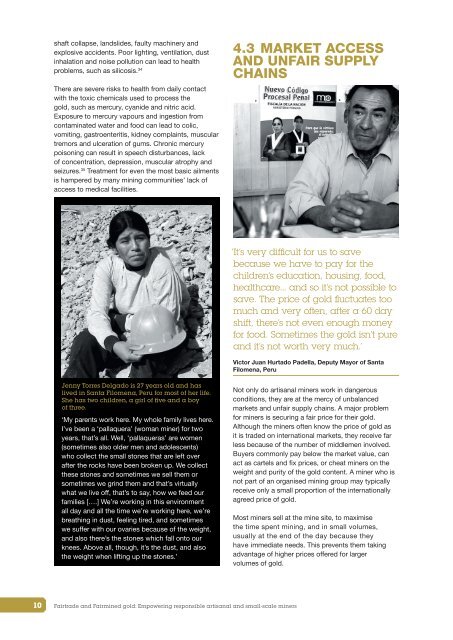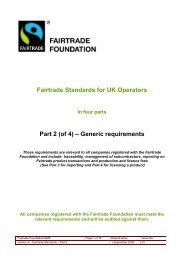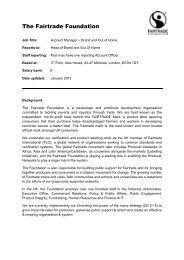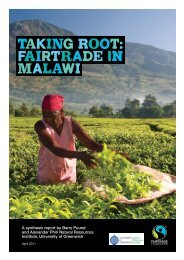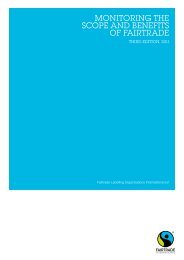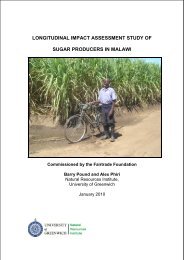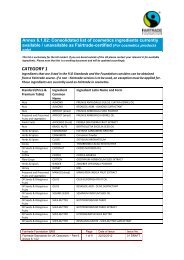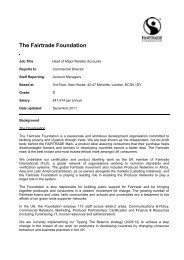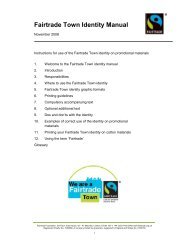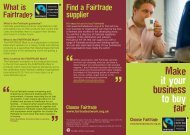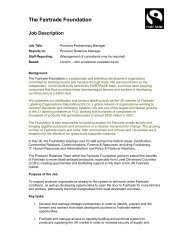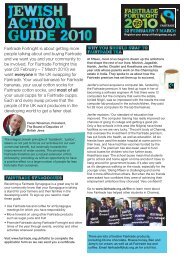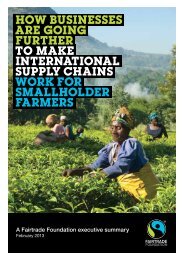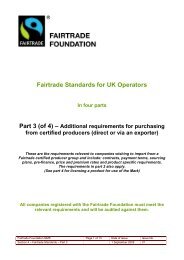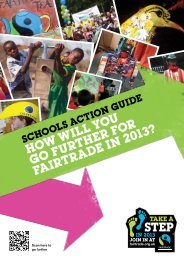FAIRTRADE AND FAIRMINED GOLD - The Fairtrade Foundation
FAIRTRADE AND FAIRMINED GOLD - The Fairtrade Foundation
FAIRTRADE AND FAIRMINED GOLD - The Fairtrade Foundation
Create successful ePaper yourself
Turn your PDF publications into a flip-book with our unique Google optimized e-Paper software.
shaft collapse, landslides, faulty machinery and<br />
explosive accidents. Poor lighting, ventilation, dust<br />
inhalation and noise pollution can lead to health<br />
problems, such as silicosis. 34<br />
<strong>The</strong>re are severe risks to health from daily contact<br />
with the toxic chemicals used to process the<br />
gold, such as mercury, cyanide and nitric acid.<br />
Exposure to mercury vapours and ingestion from<br />
contaminated water and food can lead to colic,<br />
vomiting, gastroenteritis, kidney complaints, muscular<br />
tremors and ulceration of gums. Chronic mercury<br />
poisoning can result in speech disturbances, lack<br />
of concentration, depression, muscular atrophy and<br />
seizures. 35 Treatment for even the most basic ailments<br />
is hampered by many mining communities’ lack of<br />
access to medical facilities.<br />
Jenny Torres Delgado is 27 years old and has<br />
lived in Santa Filomena, Peru for most of her life.<br />
She has two children, a girl of five and a boy<br />
of three.<br />
‘My parents work here. My whole family lives here.<br />
I’ve been a ‘pallaquera’ (woman miner) for two<br />
years, that’s all. Well, ‘pallaqueras’ are women<br />
(sometimes also older men and adolescents)<br />
who collect the small stones that are left over<br />
after the rocks have been broken up. We collect<br />
these stones and sometimes we sell them or<br />
sometimes we grind them and that’s virtually<br />
what we live off, that’s to say, how we feed our<br />
families [….] We’re working in this environment<br />
all day and all the time we’re working here, we’re<br />
breathing in dust, feeling tired, and sometimes<br />
we suffer with our ovaries because of the weight,<br />
and also there’s the stones which fall onto our<br />
knees. Above all, though, it’s the dust, and also<br />
the weight when lifting up the stones.’<br />
10 <strong>Fairtrade</strong> and Fairmined gold: Empowering responsible artisanal and small-scale miners<br />
4.3 MARKET ACCESS<br />
<strong>AND</strong> UNFAIR SUPPLY<br />
CHAINS<br />
‘It’s very difficult for us to save<br />
because we have to pay for the<br />
children’s education, housing, food,<br />
healthcare... and so it’s not possible to<br />
save. <strong>The</strong> price of gold fluctuates too<br />
much and very often, after a 60 day<br />
shift, there’s not even enough money<br />
for food. Sometimes the gold isn’t pure<br />
and it’s not worth very much.’<br />
Victor Juan Hurtado Padella, Deputy Mayor of Santa<br />
Filomena, Peru<br />
Not only do artisanal miners work in dangerous<br />
conditions, they are at the mercy of unbalanced<br />
markets and unfair supply chains. A major problem<br />
for miners is securing a fair price for their gold.<br />
Although the miners often know the price of gold as<br />
it is traded on international markets, they receive far<br />
less because of the number of middlemen involved.<br />
Buyers commonly pay below the market value, can<br />
act as cartels and fix prices, or cheat miners on the<br />
weight and purity of the gold content. A miner who is<br />
not part of an organised mining group may typically<br />
receive only a small proportion of the internationally<br />
agreed price of gold.<br />
Most miners sell at the mine site, to maximise<br />
the time spent mining, and in small volumes,<br />
usually at the end of the day because they<br />
have immediate needs. This prevents them taking<br />
advantage of higher prices offered for larger<br />
volumes of gold.


